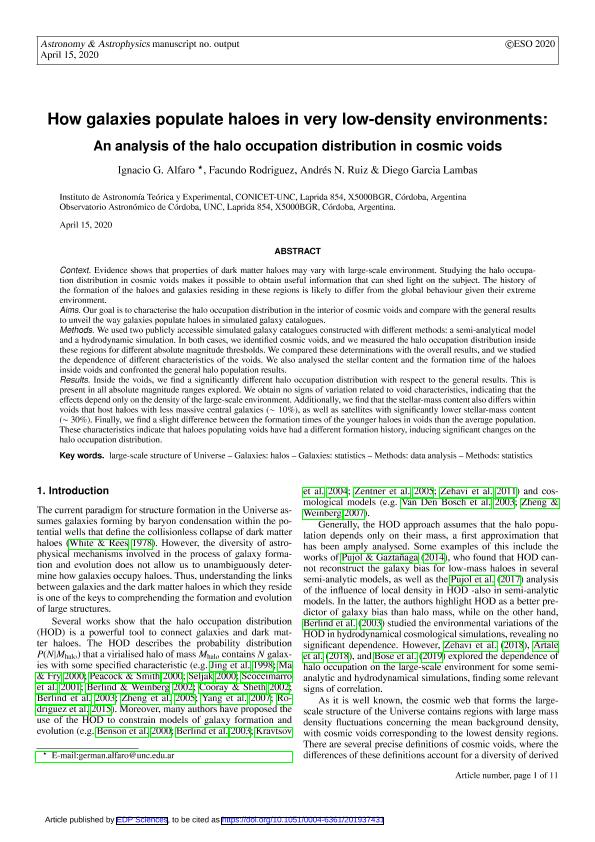Mostrar el registro sencillo del ítem
dc.contributor.author
Alfaro, Ignacio Germán

dc.contributor.author
Rodriguez, Facundo

dc.contributor.author
Ruiz, Andrés Nicolás

dc.contributor.author
Garcia Lambas, Diego Rodolfo

dc.date.available
2021-09-20T17:40:27Z
dc.date.issued
2020-06
dc.identifier.citation
Alfaro, Ignacio Germán; Rodriguez, Facundo; Ruiz, Andrés Nicolás; Garcia Lambas, Diego Rodolfo; How galaxies populate haloes in very low-density environments: An analysis of the halo occupation distribution in cosmic voids; EDP Sciences; Astronomy and Astrophysics; 638; 6-2020; 1-11
dc.identifier.issn
0004-6361
dc.identifier.uri
http://hdl.handle.net/11336/140905
dc.description.abstract
Evidence shows properties of dark matter haloes may vary with large-scale environment. By studying the halo occupation distribution in cosmic voids it is possible to obtain useful information that can shed light on the subject. The history of the formation of the haloes and galaxies residing in these regions is likely to differ from the global behaviour given their extreme environment. We use two public access simulated galaxy catalogues constructed with different methods: a semi-analytical model and a hydrodynamic simulation. In both, we identify cosmic voids and we measure the halo occupation distribution inside these regions for different absolute magnitude thresholds. We compare these determinations with the overall results and we study the dependence of different characteristics of the voids. Also, we analyze the stellar content and the formation time of the haloes inside voids and confront the general halo population results. Inside the voids, we find a significantly different halo occupation distribution with respect to the general results. This is present in all absolute magnitude ranges explored. We obtain no signs of variation related to void characteristics indicating that the effects depend only on the density of the large-scale environment. Additionally, we find that the stellar mass content also differs within voids, which host haloes with less massive central galaxies (10%) as well as satellites with significantly lower stellar mass content (30%). Finally, we find a slight difference between the formation times of the haloes which are younger in voids than the average population. These characteristics indicate that haloes populating voids have had a different formation history, inducing significant changes on the halo occupation distribution.
dc.format
application/pdf
dc.language.iso
eng
dc.publisher
EDP Sciences

dc.rights
info:eu-repo/semantics/openAccess
dc.rights.uri
https://creativecommons.org/licenses/by-nc-sa/2.5/ar/
dc.subject
GALAXIES: HALOS
dc.subject
GALAXIES: STATISTICS
dc.subject
LARGE-SCALE STRUCTURE OF UNIVERSE
dc.subject
METHODS: DATA ANALYSIS
dc.subject
METHODS: STATISTICAL
dc.subject.classification
Astronomía

dc.subject.classification
Ciencias Físicas

dc.subject.classification
CIENCIAS NATURALES Y EXACTAS

dc.title
How galaxies populate haloes in very low-density environments: An analysis of the halo occupation distribution in cosmic voids
dc.type
info:eu-repo/semantics/article
dc.type
info:ar-repo/semantics/artículo
dc.type
info:eu-repo/semantics/publishedVersion
dc.date.updated
2021-04-23T16:42:36Z
dc.identifier.eissn
1432-0746
dc.journal.volume
638
dc.journal.pagination
1-11
dc.journal.pais
Francia

dc.description.fil
Fil: Alfaro, Ignacio Germán. Universidad Nacional de Córdoba. Observatorio Astronómico de Córdoba; Argentina. Consejo Nacional de Investigaciones Científicas y Técnicas. Centro Científico Tecnológico Conicet - Córdoba. Instituto de Astronomía Teórica y Experimental. Universidad Nacional de Córdoba. Observatorio Astronómico de Córdoba. Instituto de Astronomía Teórica y Experimental; Argentina
dc.description.fil
Fil: Rodriguez, Facundo. Universidad Nacional de Córdoba. Observatorio Astronómico de Córdoba; Argentina. Consejo Nacional de Investigaciones Científicas y Técnicas. Centro Científico Tecnológico Conicet - Córdoba. Instituto de Astronomía Teórica y Experimental. Universidad Nacional de Córdoba. Observatorio Astronómico de Córdoba. Instituto de Astronomía Teórica y Experimental; Argentina
dc.description.fil
Fil: Ruiz, Andrés Nicolás. Consejo Nacional de Investigaciones Científicas y Técnicas. Centro Científico Tecnológico Conicet - Córdoba. Instituto de Astronomía Teórica y Experimental. Universidad Nacional de Córdoba. Observatorio Astronómico de Córdoba. Instituto de Astronomía Teórica y Experimental; Argentina. Universidad Nacional de Córdoba. Observatorio Astronómico de Córdoba; Argentina
dc.description.fil
Fil: Garcia Lambas, Diego Rodolfo. Consejo Nacional de Investigaciones Científicas y Técnicas. Centro Científico Tecnológico Conicet - Córdoba. Instituto de Astronomía Teórica y Experimental. Universidad Nacional de Córdoba. Observatorio Astronómico de Córdoba. Instituto de Astronomía Teórica y Experimental; Argentina. Universidad Nacional de Córdoba. Observatorio Astronómico de Córdoba; Argentina
dc.journal.title
Astronomy and Astrophysics

dc.relation.alternativeid
info:eu-repo/semantics/altIdentifier/url/https://www.aanda.org/10.1051/0004-6361/201937431
dc.relation.alternativeid
info:eu-repo/semantics/altIdentifier/doi/http://dx.doi.org/10.1051/0004-6361/201937431
Archivos asociados
